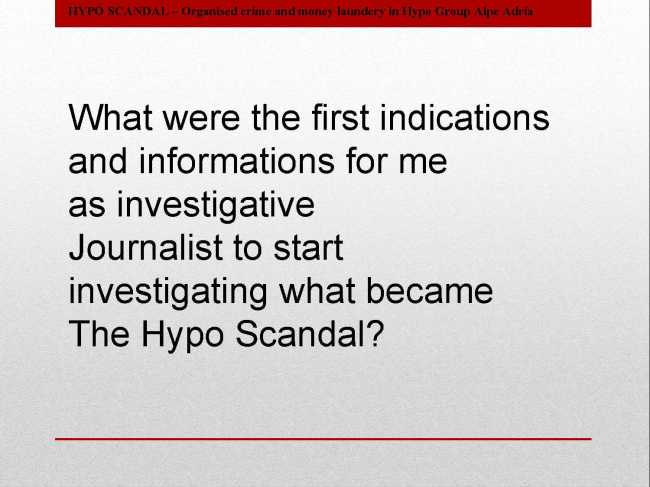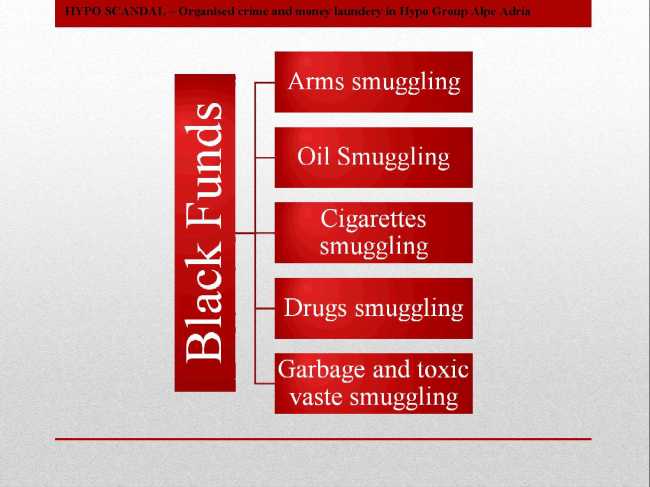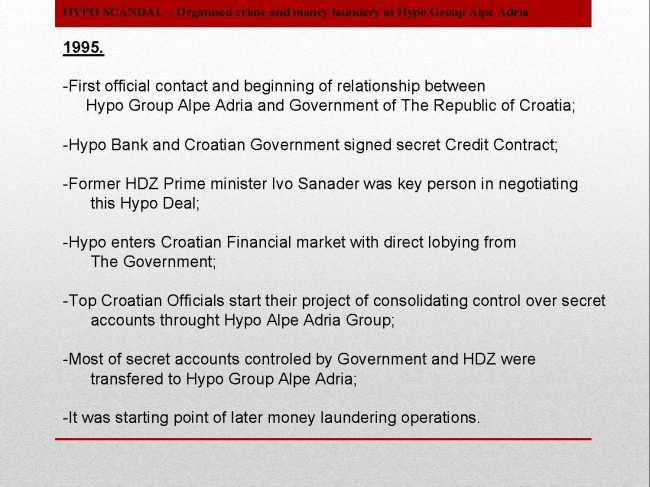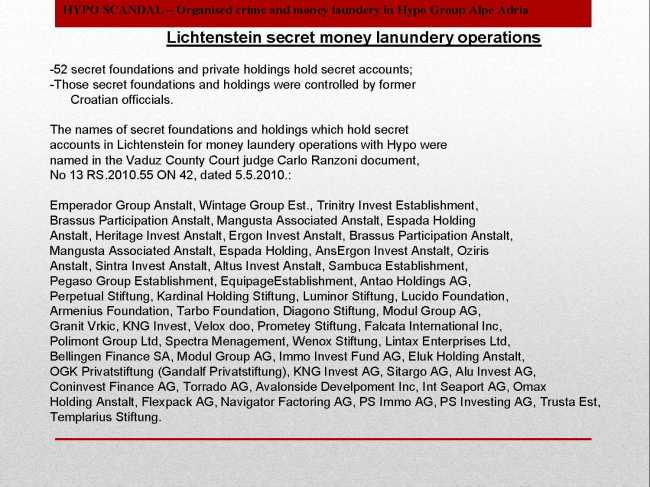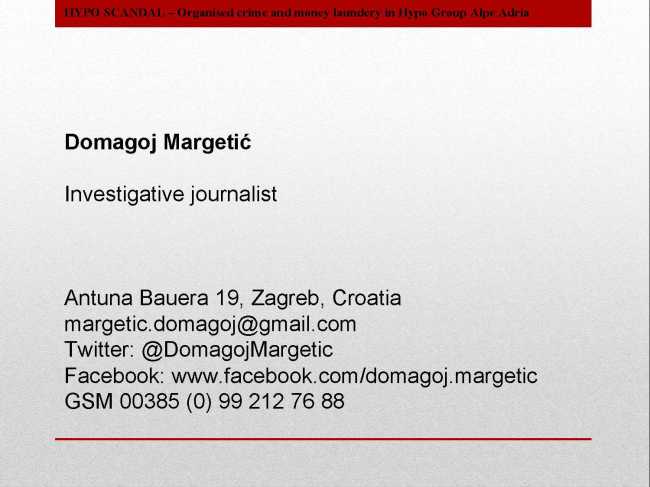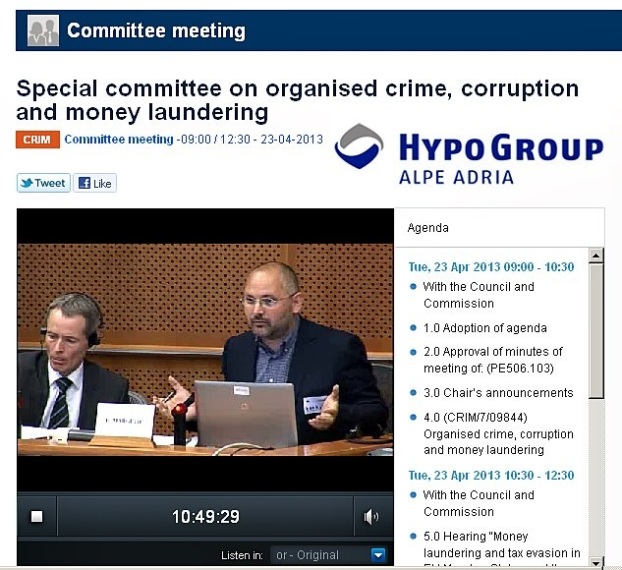
Picture: “Medical research has proven that the best remedy against depression is to take a walk. Should you end up walking long enough, you may end up leaving this depressing country.” — Occupy Croatia.
Sisak, Croatia, Thursday, April 11, 2013
BD put her tennis shoes on, on Thursday, April 11, 2013, to go for a quick power-walk. Walking very quickly preoccupied with her worried thoughts about the latest unbelievable happenings in the country, she momentarily realized that she has coincidentally arrived at the Sisak train station. In her sporty outfit, she quickly realized the meaning of why she was here – she purchased the train ticket and hopped on the train.
35 miles later she was in Zagreb, Croatian capital. She arrived to support her friend, Domagoj Margetic, an investigative journalist, at the peaceful protest rally “No to Censorship!” (Ne Cenzuri!).
25 protesters were present at the peaceful rally, and each one of them had an ‘angel savior,’ a policeman, shadowing over them, empty-handed citizens with often only a pencil in their hand, in support of journalistic excellence. Every policeman had body armor and a helmet. Five official police cars were present, along with five police motorcycles.
Thirty days earlier, on March 11, 2013 Domagoj Margetic wrote in his letter declaring why he has chosen Hunger Strike as a mode of protest:
“This is my last attempt to set, through my example, to point out the extremely difficult existential and professional position in which Croatia’s investigative journalists have found themselves. We sought to open cases and corruption scandals, which, because of their political background and because [of] high-profile corruption which are networked [within] institutions in this country, and [linked] to a certain political party, never should be published. So my fault and some of my colleagues is very clear: we wrote what was forbidden to write, we provided the public access to information that never should have become public. In short, we wrote and spoke about the forbidden truths.”
At the British Square, or the so called ‘Britanac,’ after all the rally members were rounded up together, and the news crews presented their reporting to the TV cable news, the official statement was issued. Domagoj Margetic sent a public appeal to the President of Croatia symbolically urging two things:
“First the public statements of the President, which will notably thank investigative journalists who uncovered major corruption scandals for their contribution in the fight against corruption in this country, in which the President would ask the government and public sector to rehabilitate those journalists after numerous difficulties that they faced confronting certain ‘censored’ topics.
Second, the public statements of the President on the necessity of passing the Whistleblowing Law on the Protection of those persons who notify of corruption and legal mechanisms to protect journalists who reveal those corruption affairs.”
As an investigative journalist, Domagoj Margetic has been publically ostracized for years. He knew too much, and he could not be paid off. He understood that it takes only one bribe to fall under the control of the ‘legacy political systems,’ and in that respect he was not going to be compromised.
It was publicly known that Margetic was the one of the first investigative journalist who researched, wrote and discovered some of the biggest corruption scandals in Croatia, among them:
- Hypo Bank scandal;
- Political Corruption in the Customs;
- Affair HAC;
- Case Soboli;
- Affair INA and smuggling oil through INA;
- Cigarette smuggling and tobacco mafia;
- Illegal conversion and privatization of TDZ and TDR;
- Case U.S.;
- Case Geotechnical Engineering;
- Case secret bank accounts in Villach;
- Case of secret bank accounts at Privredna Banka;
- War crimes cases: Sijekovac, Brod, Mrkonjic Grad and Sisak;
- Affair on illegal conversions, privatization and illegal operations of the Bank of Zagreb, as well as
- Cases of the Croatian Post, Croatian Postal Bank and the Bank of Dubrovnik.
In America, an investigative journalist like Domagoj Margetic would have followed career steps of someone like Michael Lewis, earning millions of dollars and being successful. In Croatia, he will go on a hunger strike to hard headedly prove his point, because no one is listening. Everything is censored.
As one of the Croatian journalists once said, in a 2011 focus group ran and sponsored by international organization, including George Soros’ Open Society, “TV shows easily get killed on the Croatian state television. It is forbidden to talk about everything, including about the fact that it is forbidden to talk.” In Croatia, censorship is in force. Censorship is not punishable. Those that enforce censorship are getting richer by censorship, and hence, Croatian media refuses to seriously tackle this issue. Non-existence of the real freedom of the press and speech – ends up as marginalized personal stories of journalists such as Domagoj Margetic. Speaking on television shows about politicians mainly means signing the death penalty for the show, and as Margetic has often done so – for himself. As of today, April 15, 2013 Domagoj Margetic is on his 36th day of Hunger Strike.
Back to the “No to Censorship!” Rally on April 11th. The group strolled to Pantovčak, best known as the location of the Croatian Presidential Palace where the current Croatian President, Ivo Josipovic, receives visitors. The group strolled quietly, without shouting and without provoking. The police shadowed the pedestrians walking and riding along them.
Police cars passed the pedestrians, and 100 meters prior to the Presidential Palace, they stopped the protest proceedings. Here they stood for a longer than half an hour. Domagoj Margetic sat in the wheelchair designed for handicapped. He was too weak after his 30+ days of hunger strike to stand any longer.
In a swirl of activity, police received some more assistance at this point, and invited the group to enter into the little street with no pass through. There, they collected everyone’s identification documents, and having named the reasons of ‘walking on the street’, police arrested five or six people who are taken into police cars, including a young woman, Marijana Mirt, who has joined the hunger strike six days prior.
The event culminated at the point when the police fetched Domagoj Margetic, who has been feeling nauseous the whole day. Police stood him up from the wheel chair to take him into the police car. Domagoj could hardly walk at this point, and in front of the police car door, he falls unconscious.
The protestors call the “Urgent Care Ambulance” – but there appears to be a strange delay in arrival. The protestors talk amongst themselves about how a pizza delivery would arrive faster than the ambulatory car. Domagoj was taken into one hospital, and then to another, followed the whole time by a police member. The police did not allow anyone else to come with him to the hospital. From the hospital, after his condition improved, he was taken directly into the Police Station.
Margetic was told by police during this time: “We are not going to kill you, but we will not let you live, either.”
As Seebiz.net reported, “So far it is not known why they were arrested.”
Disclosure: Domagoj Margetic regularly reports for Seebiz.net as an independent freelance journalist.
Instead of reacting to Domagoj Margetic’s requirements, which are indeed symbolic, President Josipovic has requested from the police to enforce a police state-type strictness. According to Seebiz.net, about 30 people were arrested, and among them were Marijana Mirt and Ana Veliki both who have begun a hunger strike, in support of Domagoj Maregetic’s demands.
A day later, police insisted that no one was arrested, and that protestors were only moved from the premises near the Presidential Palace, a statement, which speaks for itself with no further comment required.
BD from Sisak commented the following day,
“I just want to note one thing. Not very many people showed up at the rally again today, not even those who live in Zagreb and that support Domagoj Margetic and his cause. I came to the protest all the way from Sisak, because I cannot watch what is happening in our country any longer. I came to be with my friend, a man who is protesting in the most difficult way, with hunger, in order to fight for truth and for justice. Of course, not many colleague journalists came by either, except for Ms. Hana Tabakovic, and we are much thankful to her. She is the only brave journalist, committed to the dissemination of the truth.”
Not the only one though. During the last week of the hunger strike, several other Croatian news casters fought for Margetic’s cause against censorship. A prominent Denis Latin was only able to join the cause after he was removed as an editor from the state-run Croatian television station, HTV. He was replaced.
On Friday, April 12, the “No to Censorship!” protest resumed in the capital’s center square joined by two presidents of the independent road building union and the national teachers association. Domagoj Margetic was thrilled and ecstatic.
On Sunday, April 14, Croatian citizens voted, in a low turnout of only 25% election, who voted to choose whom they would be sending as their representatives to the European Parliament, assuming that Croatia joins European Union in July, 2013. 70% of those that voted, either voted for “Nobody” or declared their vote as invalid through various tragically humorous ways.
On Monday, April 15, Domagoj Margetic, after much deliberation, and written documents requiring Formal Appeals, received travelling papers from the local Police Station, which will allow him to testify in front of European Parliament about the Hypo Alpe Adria Group scandal in the Balkans. Despite his failing health, he will be putting his tennis shoes on, to thread all the way to the Brussels.
He is on 36th day of Hunger Strike. His symbolic requests have still not been met.

